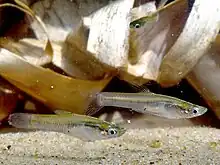Cnesterodontini
Cnesterodontini is a tribe of fishes which are within the subfamily Poeciliinae of the family Poeciliidae.[2] This tribe is distinguished from other tribes in the Poeciliinae by the males having five rays in the pelvic fin, there is a pedicle at the base of the third ray which joins it to the fourth ray, another pedicle at the third rays tip and a membrane there too.[3]
| Cnesterodontini | |
|---|---|
 | |
| Cnesterodon decemmaculatus | |
| Scientific classification | |
| Domain: | Eukaryota |
| Kingdom: | Animalia |
| Phylum: | Chordata |
| Class: | Actinopterygii |
| Order: | Cyprinodontiformes |
| Family: | Poeciliidae |
| Subfamily: | Poeciliinae |
| Tribe: | Cnesterodontini Hubbs, 1924[1] |
Genera
The following genera are included within the tribe:[2]
- Cnesterodon Garman, 1895
- Phalloceros Eigenmann, 1907
- Phalloptychus Eigenmann, 1907
- Phallotorynus Henn, 1916
- Tomeurus Eigenmann, 1909
Other workers include only Cnestrodon, Phallotorynus and Phalloceros while putting Tomerues in its own tribe, the Tomeurini, and Phalloptychus into a new tribe called Girardinini along with the genera Girardinus, Phallichthys, Xenophallus and Poeciliopsis.[3]
References
- Richard van der Laan; William N. Eschmeyer & Ronald Fricke (2014). "Family-group names of Recent fishes". Zootaxa. 3882 (2): 001–230. doi:10.11646/zootaxa.3882.1.1. PMID 25543675.
- J. S. Nelson; T. C. Grande; M. V. H. Wilson (2016). Fishes of the World (5th ed.). Wiley. p. 380. ISBN 978-1-118-34233-6. Archived from the original on 2019-04-08. Retrieved 2019-11-10.
- Paulo Henrique Franco Lucinda; Roberto E. Reis (2005). "Systematics of the subfamily Poeciliinae Bonaparte (Cyprinodontiformes: Poeciliidae), with an emphasis on the tribe Cnesterodontini Hubbs". Neotropical Ichthyology. 3 (1): 1–60. doi:10.1590/S1679-62252005000100001.
This article is issued from Wikipedia. The text is licensed under Creative Commons - Attribution - Sharealike. Additional terms may apply for the media files.